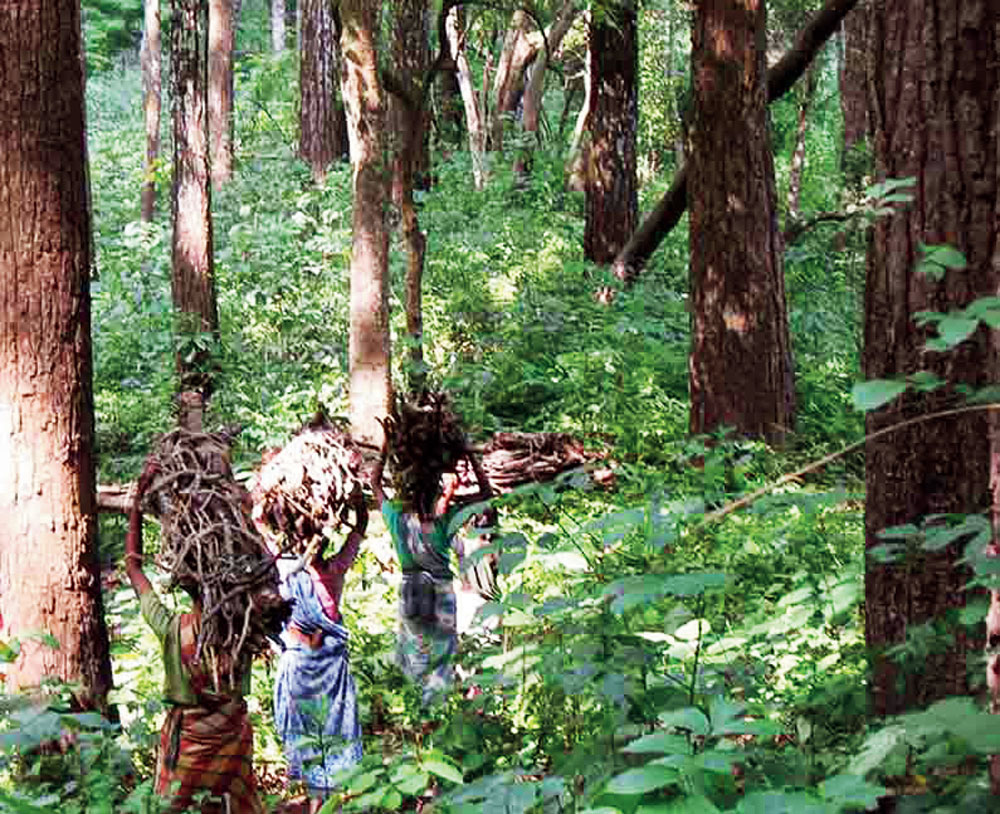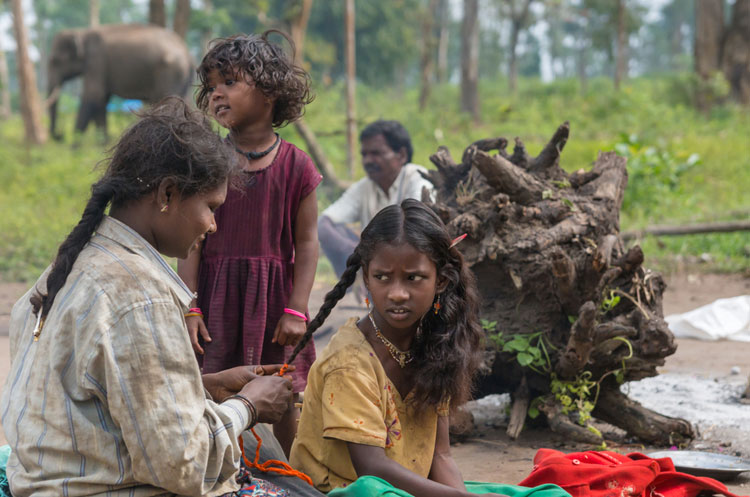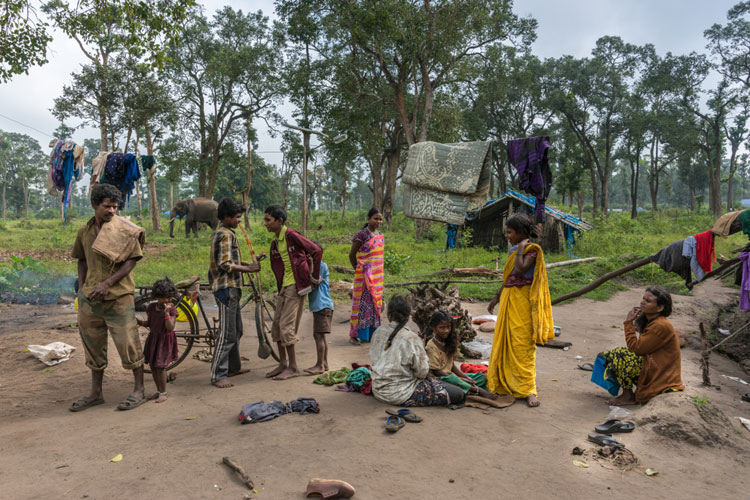The author is former professor of Economics, IIM Calcutta
Forests are considered planetary resources of great importance: as carbon sinks, as repositories for biodiversity, as effective tools for local climate control, and as a source of timber and related produce. Forests have been dwelling places for people, too. It is important from the point of view of sustainable development that forests be preserved and biodiversity conserved for future generations. Sustainable development also entails that the present generation does not suffer in the process. There is a persistent tension between present demands and future security. In India for centuries, forests have been used by human beings for a variety of purposes — from habitat to a store of food to sources of livelihood. Anywhere between 100 million to 300 million people, mostly tribes, live in and around forests. They are poor and undernourished, with little education and access to healthcare. They depend on the forests for living and livelihoods. They have always lived in harmony within the ecosystem of forests.
It was in the late 19th and early 20th centuries that the British began to treat forests as wasteland that could be used for extending agricultural production of commercial crops. Forests could also be used as a source of timber for export. Timber was extensively used in railway sleepers during the rapid expansion of railway tracks. To consolidate the colonial government’s hold on the forest land and resources, the Indian Forest Act of 1927 was passed. According to it, there were three categories of forests: reserved, protected and village. A reserved forest could be notified on any tract of forest or wasteland not belonging to the government. In such a forest, nothing was permitted unless allowed by the government. Forest officials became the real controllers. Protected forests were notified areas where trees, or a class of trees and, much later, some endangered species were preserved. The government was allowed to assign rights for using a part of a reserve forest (usually adjacent to a village) to be used by the local community. The upshot was clear: the government could ‘create’ forestland, exploit it according to need, and the original forest dwellers became trespassers in their own land, living at the mercy of forest officials.
In the last four or five decades the environmental value of forests began to be better appreciated, but people continued to be left out of the discourse on conservation. If anything, the practices of forest dwellers were looked upon with suspicion. Their farming and hunting practices could make forests unsustainable. Without alternative employment and new livelihoods, forest dwellers were left out of the bonanza of both the socialist model of development as well as the neo-liberal one.
Social activism finally led the United Progressive Alliance government to enact the Forest Rights Act in 2006, which brought back people into the discussion. Claims of rights based on past evidence of residence and connections with forests were allowed to be heard and considered. But even after 13 years of the enactment only 3 per cent of the claims have been settled. A large number of claims have been rejected. Two things are fuzzy about the law. First, for a genuine forest dweller it is difficult to provide legally acceptable documents. Second, false claims could also be made to enter the forest and use resources for commercial purposes. This legal twilight zone led to increased harassment, evictions, extortions and even molestation by forest officials. They have complete authority over the lives of the genuine forest dwellers. But the important thing about the 2006 FRA was the de jure recognition of forest people and their entitlements.
Things changed with the advent of achche din. Since 2014, the National Democratic Alliance government had been considering diluting the provisions of many environmental laws. It drafted a bill called the Indian Forest Act 2019, and the draft has been sent to state governments for comments. This draft bill overturns the spirit of the 2006 FRA. People are considered unimportant when it comes to the commercial greed of big business. Some of the clauses are extraordinarily undemocratic and might have put the framers of the 1927 colonial act to shame.
The draft has pious objectives though: of “conservation, enrichment and sustainable management of forest resources and matters connected therewith to safeguard ecological stability to ensure provision of ecosystem services in perpetuity and to address the concerns related to climate change and international commitments”. Forests are defined in this draft as “any government or private or institutional land recorded as forest/forest land in any government record and the lands managed by government/community as forest and mangroves, and also any land which the central or state government may by notification declare to be forest for the purpose of this Act”. If the state or Central government feels that giving people rights under FRA will hamper conservation then it may commute these rights by paying monetary remuneration, or similar size of land outside the forest, or in any other way it thinks fit. Two implications emerge from these assertions. First, virtually any tract of land can be made a forest if it has trees on it. Second, people’s rights are of no importance; these are arbitrarily controlled by forest officials. The draft also proposes a fourth category of forests, namely, production forests where timber, pulp, pulpwood, firewood, non-timber products, medicinal plants, or any forest species can be grown and harvested for increasing production. The government can classify any tract of land as production forest and can lease it out commercially.
Forest officials have been given almost unlimited powers by which, according to many experts, the repression of tribal people and forest dwellers will increase many times. The officials will have powers to take away the rights of the people, pay arbitrary compensation, imprison them, and use firearms on duty without having to explain why they did so. They cannot be arrested on any deemed offence they committed while on duty. State governments have been made responsible for the provision of adequate detention rooms, along with arms and ammunition for use against people who allegedly try to destroy the forest. Even if dry fallen leaves are picked it can be interpreted as intent to destroy. A charge against a local resident means he or she is guilty unless proven innocent. So poor people and political activists can be easily wiped out from forests. The real poachers and trespassers might be protected and cronies can ask for leases on production forests expecting fat profits.
The condition and extent of forest cover in India, the lives of 300 million people and the privileges of the rich backed by State power will be locked in a three-cornered struggle. The forests and the poor people had lived in harmony for centuries. Now both are in jeopardy from State machinery and money power. As they did to coastal zones, as they did to the mangroves, they will do to forests. Commercial plantations are not forests in terms of biodiversity and variety of the gene pool. But they are good commercial propositions.
Who can contest the Holy Grail of environmental conservation? If the draft is accepted, then forests will become a police State that will turn away 300 million people from their homes and livelihoods. But when did India care for its very poor except on paper? Certainly not during the current authoritarian regime. Now the paper commitment is also being done away with.













